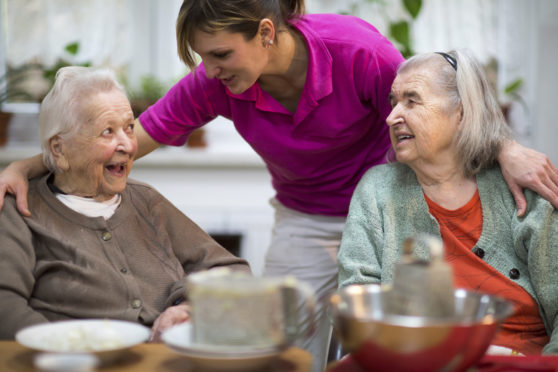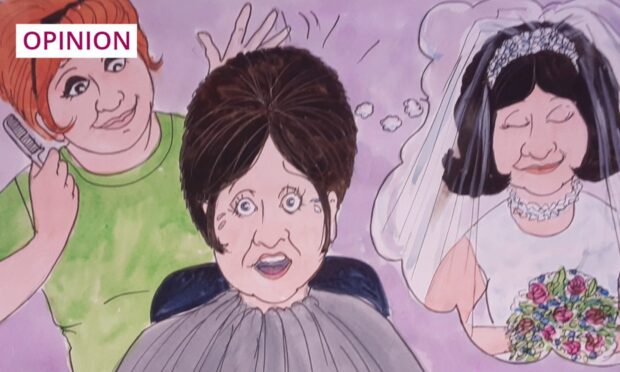What do you do when, night after night as a carer, your sleep is broken by shouts of distress and confusion?
When a frail, vulnerable old person cries plaintively for their mammy because they forget she is dead. When you give everything inside that your love for them demands of you, but they look in bewilderment and say: “Who are you?”
What do you do? You comfort and you hold, you make tea at 3am and feed it through a straw despite your weariness, you smile reassuringly and sometimes, when you’re weakest, you cry silently because your world has shrunk into a place filled with urine and faeces and blood and vomit and sadness. Then you sleep for a bit and get up and do it again. What you don’t do is rely on the state – because you know their priorities are not yours.
In the days before this week’s budget, an interesting letter was sent to a national newspaper. Nineteen signatories from different economic and social welfare organisations called on Chancellor Rishi Sunak to recognise caring as society’s “infrastructure”, and invest as he might in bridges and buildings. He didn’t, of course. Interestingly, thirty billion pounds was found instantly for coronavirus but the pandemic that will still be multiplying when everyone has forgotten what coronavirus is was not specifically addressed.
Not everyone has family prepared to care. So, recent announcements by Home Secretary Priti Patel about post-Brexit immigration made me angry. It wasn’t just that her proposed system would probably have prevented her being anywhere near Downing Street because her Ugandan Asian parents would have been barred from entering Britain. It was because the policy highlighted the ugly racism that fuelled so much of the Brexit debate and has led to us supposedly, “controlling our borders”. Or pulling up the drawbridge, more like.
The care system is already in crisis. Now, government demands that immigrants earn a minimum of £30,000 will rule out care workers entering Britain. In Scotland, the care sector is the fourth biggest economic contributor and 16% of the workforce are foreign. According to the government, their work is “low skill”.
Low skill? Anyone with experience of caring knows the physical and emotional resources needed: the levels of empathy, compassion, patience, resilience, and sheer physical stamina – not to mention the understanding of psychology. What topsy turvy values we have! Someone with a bit of dexterity with a football will be allowed into Britain. Someone prepared to look after our most vulnerable old people won’t.
The chief executive of the East European Resource Centre, Barbara Drozdowicz, commented: “Let’s not kid ourselves: someone will have to do the dirty, low paid jobs from construction to food processing to social care.” She’s right. But how sick that this situation has arisen. Bad enough that people from poor countries come to do our “dirty work” . But why is caring such a low paid, undervalued job in the first place? Perhaps, at least partly, because an army of women have traditionally made up the ranks of carers.
More families will be affected over time by the care crisis than coronavirus, though you wouldn’t know it from our economic priorities. Currently, there are around eight million carers in Britain, 759,000 of them in Scotland. Just over a million of them live in poverty – yet they save the economy 132 billion pounds. Without them, the NHS would collapse – yet 72% of them develop mental health issues and 61% physical ailments through caring. Eight out of ten feel lonely or socially isolated. Why do they do it? Because they love. They care. And soon, they will do it because nobody else will.
Our social care system suffers neglect and is infected by toxic ideas and language. There is talk of a “crackdown”, as if the people who have come here from abroad, who have paid their taxes and contributed to our society by doing the jobs we haven’t wanted to do ourselves, are somehow “undesirables”. They are accused of “jumping the queue”. What queue? Who has their hand up to do the hard, low-paid, thankless job of caring? We are already 90,000 care workers short across the country.
The economic strategy pursued by Westminster is all wrong – especially for Scotland. Back in 2004, First Minister Jack McConnell introduced the Fresh Talent Initiative, encouraging young, newly qualified foreign graduates to stay for two years after graduation because Scotland’s economy needs migrants to function effectively. Nothing has changed. Any Scottish population growth up to 2041 will come from migration. Our farming and fishing businesses, our construction industry , and our health sector, need foreign staff to produce, to build, and to care.
It is to be hoped that in the midst of their youth, and their power, and their privilege, Prime Minister Johnson, and Rishi Sunak, and Priti Patel, remember to invest time in their families so that in their demented dotage, someone will love them enough to take care of them. Because down the care home, the lights will be out and the paid staff will have left long ago.











